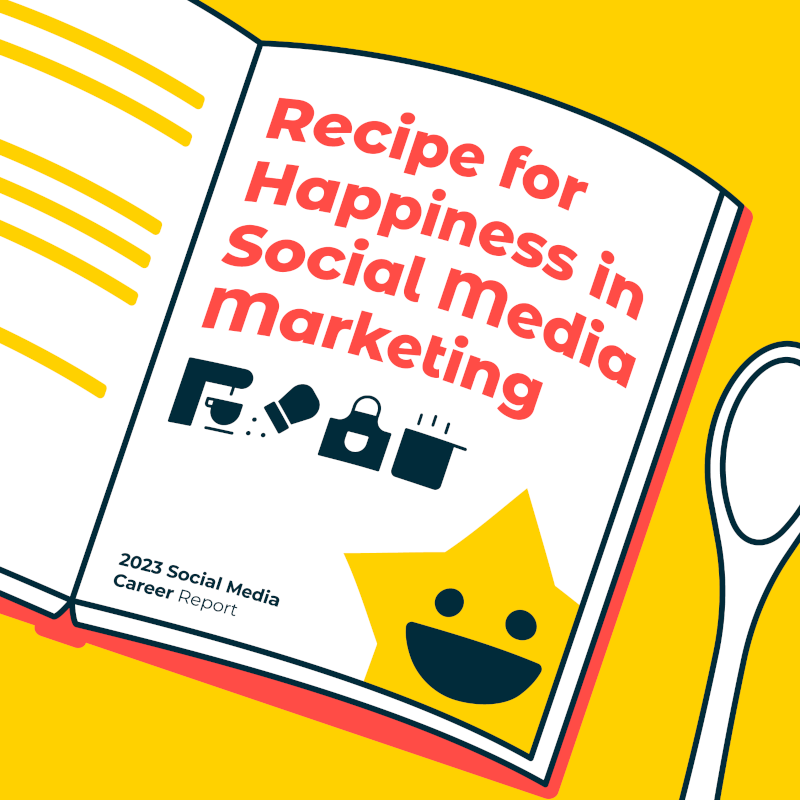Table of Contents
Social media can feel inescapable, even for casual users. On average, users spend almost 2 ½ hours on social media every day — that adds up to more than a full month each year. No wonder so many of us are experiencing social media burnout.
For social media professionals, it can be even more overwhelming. How do you take a break from social media when it’s your job?
There’s a reason social media managers are prone to burnout. Social is a demanding role that’s hard to leave behind at the end of the day. “Taking your work home with you” has a more literal meaning when your work is always lurking behind the icons on your phone.
Combating social burnout isn’t easy. But it’s necessary, especially when more and more employees are exhausted, stressed, and overwhelmed. In November 2021, a record number of workers quit their jobs. That means addressing mental health isn’t just in the employees’ best interest — it’s also best for the company.
Bonus: Get a free guide that shows you 8 Ways to Use Hootsuite to Help Your Work-Life Balance. Find out how to spend more time offline by automating many of your daily social media work tasks.
Burnout is defined as “feelings of depleted energy or exhaustion because of continual stress.” In 2019, the World Health Organization recognized burnout as an occupational phenomenon.
There are three main indicators of burnout: exhaustion, cynicism, and decreased professional efficacy. If you’re tired, disengaged, and unable to find pride or enjoyment in your work, you might be at risk of burning out. One recent survey found that 89% of surveyed employees had experienced burnout in the last year.
Social media burnout is a related phenomenon, recognized by researchers in 2018. People experiencing social media burnout may feel:
- Exhausted or fatigued
- Anxious
- Emotionally disengaged
- Constantly distracted or unable to focus
- Unable to find meaning or value in their work
It’s also linked to social media addiction: the more you use social media, the more likely you are to experience burnout. And using social media while experiencing burnout can heighten negative feelings and stress. This is particularly tough when you feel like you can’t unplug, like the 73% of social media managers who feel like they need to be “always on.”
For social marketers, social media burnout is the result of workplace conditions. That’s why the WHO defines it as an “occupational phenomenon.”
And it’s compounded by systemic and social inequities. Deloitte’s 2022 Women at Work study found that LGBTQ+ women and women of color report higher levels of burnout and stress.
That means that solutions need to address individual behaviors as well as the larger workplace culture.
1. Set boundaries
The global COVID-19 pandemic caused huge shifts in how we work. For many, it blurred the boundaries between our personal and professional lives. When your home is your office, do you ever really leave?
If you’ve ever caught yourself opening your phone to “check one quick thing” and resurfacing 30 minutes later, you know how easy it is to get sucked in.
Your device can help with this. If you’re an iPhone user, you can set Screen Time rules. This will let you schedule downtime away from the apps that suck you in.
Choosing not to receive social media notifications outside work hours can help you avoid that constant pull. Better yet, keep your work email and accounts off your personal devices altogether.
If you’re a manager or leader, you should also set an example for your team. The best way to show them that it’s okay to unplug is by doing it yourself.
At Hootsuite, our work-life harmony policy ensures everyone is on the same page about communicating outside of work hours.
2. Check in with yourself
If you pride yourself on being a good team member and high performer, you’re probably used to pushing yourself. But that can lead to ignoring the warning signs of burnout until you’re already running on empty.
Here are a few questions to ask yourself:
- Do you feel physically or emotionally exhausted?
- Is it difficult to keep up with your workload?
- Is your work-life balance suffering?
- Do you feel isolated, unsupported, or undervalued?
- Are you feeling unsatisfied, even by your successes?
- Have you lost your sense of purpose or value in your work?
If you’re experiencing one or more warning signs of social media burnout, don’t wait until the situation gets worse.
Schedule a mental health day, talk to your manager about your workload, or implement some of the other tips below.
3. Get support at work
Social media manager roles have particularly high turnover, in part because employees are expected to do so much. It’s not unusual for one role to call for graphic design, copywriting, video editing, ad strategy, customer support and more.
On small teams, it can feel like the whole social media strategy rests on your shoulders. That’s not sustainable even in the best of times.
Sallie Poggi, Director of Social Media at UC Davis, shared some great mental health tips for social media managers. One of them was to ask for help before you need it. “Talk with your managers,” she told us. “Have a plan so that you can go on vacation and somebody can cover for you.”
4. Plan for a social media crisis
One of the best things you can do to prevent social media burnout is to have a social media crisis plan in place.
These days, online backlash is almost inevitable. Every company has fielded a bad customer review or a pre-scheduled tweet that should have been deleted.
possibly an all-time deleted tweet pic.twitter.com/EWbUZxc4Lj
— philip lewis (@Phil_Lewis_) September 8, 2022
When a crisis happens, having a plan will keep you from panicking. Your strategy should also outline responsibilities so that a single individual or small team doesn’t have to deal with the fallout alone.
While you’re at it, make sure you have a detailed employee social media policy — the best defense against a social media disaster!
For more tips on protecting your mental health while dealing with a crisis, check out our webinar on combating mental fatigue.
5. Schedule time for self-care
Burnout can’t be fixed by balancing bad workplace habits with good personal ones. If your workplace is causing you constant stress, a yoga class won’t fix it. But building self-care into your daily routines can help you weather difficult moments.
unfortunately they were right. eating 3 meals a day and exercising and not drinking alcohol and getting 8 hours of sleep does make you feel good
— samantha (@milkygoddess) September 15, 2022
And blocking out time for it can also prevent you from working around the clock. Here are a few things to try:
- If you tend to work through your breaks, put them in your calendar and set alarms.
- Eat foods that make your body feel good, and drink plenty of water.
- Schedule reminders for stretching and screen breaks.
- Use your wellness and health benefits! Don’t wait until December to book that massage.
- Sign up for a class. It can be anything from spin to ceramics, as long as you enjoy it! Committing to a regular activity will motivate you to make time for it. (This is especially true if your studio charges a fee when you miss a class… ask me how I know.)
6. Do nothing (really!)
In this age of biohacking and productivity hacks, many of us feel pressured to make every moment count. But often, we treat our leisure time like work and lean in a little too hard, tackling ambitious crafts or cooking elaborate meals.
Celeste Headlee, author of the book “Do Nothing: How to Break Away from Overworking, Overdoing, and Underliving”, believes in the power of true downtime. When managing social media burnout, downtime means putting some distance between you and your phone.
“Your brain sees your phone as work,” Headlee told NPR. Try leaving it at home when you go for a walk around the block. Or, as Headlee does, schedule one “untouchable” day each week where you don’t look at social media or email at all.

Download our Social Media Career Report for stats on social media manager salaries, benefits, job satisfaction, mental health, and more.
Get the report7. Resist hustle culture
On average, people have been working two more hours each day since the beginning of the Covid-19 pandemic. And a 2020 study found that 73% of Millennials worked more than 40 hours per week.
This doesn’t just lead to burnout. Research from the World Health Organization found that working long hours is linked to premature death, heart disease, and diabetes.
There’s a reason one of the biggest buzzwords of 2022 is “quiet quitting”. It sounds more radical than it really is. In the words of TikTokker Zaid Khan, quiet quitting is just about recognizing that there is more to life than work.
If every action has an equal and opposite reaction, then quiet quitting is the answer to hustle culture. One Gallup poll found half the American workforce identified as “quiet quitters.”
We’re not advocating that you passively withdraw at work. But if you’re working too many hours, talk to your manager.
8. Find flow in the day
One study from Adobe found that Americans spend six hours each day checking their email. Nine out of 10 survey respondents check their work emails at home, and four in 10 admitted to checking emails in the bathroom.
Likewise, social media managers feel the siren call of engagement: checking in constantly to see how posts are performing.
Entrepreneur Steve Glavesk points out that many people are constantly diverted from meaningful work. Social media notifications, emails, Slack messages from your coworkers — all of these prevent you from getting into a flow. They also fill your day with busywork, leaving you frazzled by 5pm.
Here are a few tips for staying focused:
- Schedule uninterrupted time. Block out your calendar so you can focus on your most important tasks.
- Time-block distracting tasks. Sallie Poggi also recommends time-blocking for dealing with things like notifications and emails.
- Single task. Focus on one thing at a time. Ideally, start with the most challenging task, when your energy and focus are highest.
- Shorten your meetings. Try setting your default meeting time to 30 minutes — or better yet, 25, so you always have a buffer between calls.
9. Measure outcomes, not time
The rise in remote work has also led to a rise in employee monitoring software. But digitally looking over your employees’ shoulders is a poor way to measure how hard they’re working or how well they’re spending their time. It can even exacerbate burnout by making employees feel even more pressure to work constantly.
Plus, there are plenty of creative ways to get around digital surveillance.
Instead of monitoring your team’s hours, you should be focusing on the results of their work.
And social marketers should look at how they spend their time, and what efforts pay off. Tracking key social media metrics will help you be more efficient. The goal is to work smarter, not harder.
To demonstrate your value, ensure you’re producing social media reports that quantify results. And if you manage a team, give them SMART goals that align with your business objectives.
10. Protect your rest
Here’s a familiar scenario: you get into bed after a long, hectic workday. Even though you’re tired, you find yourself scrolling endlessly on TikTok or watching Netflix. You know you should probably get some sleep— but you find yourself hitting “play” on one more episode.
There’s a name for this phenomenon: “revenge bedtime procrastination.” When your day is stressful and busy, it’s tempting to unwind with your phone late into the night. But this behavior erodes your rest and leaves you more tired the next day.
Try leaving your phone outside your bedroom at night. Get an old-fashioned alarm clock so you’re not tempted to “just check the time.”
11. Take a real break
Many of the tips above are great for preventing social media burnout. But what about if you’re already burned out? If that happens, you need a chance to truly recharge. There’s a reason runners take a full week off from exercise after a marathon.
In July 2021, Hootsuite closed the entire company for a week so that every employee could rest. We recognized that many employees were checking in on their inboxes or notifications, even while on vacation. On our company-wide Wellness Week, everyone was offline, which meant no temptation to check email.
We’re not alone in embracing the collective vacation period, either. Companies like LinkedIn and Mailchimp have made similar moves.
After our shared week off, 98% of employees reported feeling rested and recharged. So we did it again in 2022 — this time moving it to late August, based on employee feedback.
It's wellness week at Heyday by Hootsuite — and most of our team is hitting pause for the next 5 days to recharge (that includes me, the social human!)
— Heyday by Hootsuite (@heyday_ai) August 26, 2022
We’ll catch you on the flip side, world ✌️ pic.twitter.com/iVCaLxmOYD
12. Advocate for mental health resources at work
You can curb your own burnout, but chances are you’re not the only one experiencing it. Deloitte’s 2022 Women at Work survey found that one-third of employees have taken time off due to mental health challenges. However, only 43% of them feel like they could talk about those challenges at work.
Those with power in the workplace should use it to change the culture and expectations. Normalizing conversations about mental health is an important place to start.
One study found that while 91% of executives believe that employees know they care, only 56% of employees actually feel cared for. This gap is partly due to a lack of resources in the workplace. It’s one thing to say you support employee well-being and another to put supports in place that they can access.
Failing to address mental health has big consequences for businesses. A 2021 study found that 68% of Millennials and 81% of Gen Zers had left jobs for mental health reasons.
Making changes to the office can also help address some of the underlying causes of burnout, like isolation or constant distractions. In 2021, Hootsuite took a look at employee needs and reconfigured our office to meet them. These kinds of changes go deeper than design: office layouts can actually make us happier.
Ensure employees have the chance to socialize and have fun together. One recent study found that 22% of people don’t have a single friend at work. Strong social connections are important for building functional teams and supporting mental health.
No job is worth sacrificing your mental health. And no business goal is worth compromising the well-being of your employees. Preventing social media burnout and addressing it when it happens should be a priority for every company.
Hootsuite can help you stay organized, focused, and prepared to handle anything on social media. Try it for free today.







